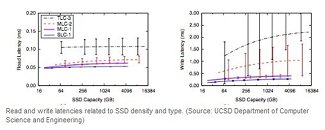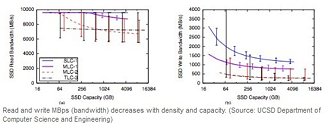Monday, February 20th 2012
Future of SSDs Not So Solid: Research
Researchers at the University of California, San Diego, have concluded that solid state drives (SSDs) have a bleak future in the evolution of computing technology. They have discovered that fast flash based storage are facing come pretty glaring technology hurdles during their natural course of evolution, which they don't think it will overcome. To begin with, shrinking (miniaturizing) them, to increase capacity or decrease manufacturing costs, will severely degrade performance beyond a point, 6.5 nm silicon fab process.
The scientists studied 45 different flash chips in various sizes, which showed that scaling of latencies and error-rates are 'tolerable' enough as the technology miniaturizes only till 6.5 nm, or the year 2024, when this fab process will be common, beyond which they question the drives' viability. Beyond this point, the more capacity you squeeze into flash memory chips, the more performance degrade (latency and error-rate scale beyond tolerable scales).While the density of SSDs grows and the cost per gigabyte shrinks, "everything else about them is poised to get worse," said Laura Grupp, a graduate student at the University of California, San Diego. "This makes the future of SSDs cloudy: While the growing capacity of SSDs and high IOP rates will make them attractive for many applications, the reduction in performance that is necessary to increase capacity while keeping costs in check may make it difficult for SSDs to scale as a viable technology for some applications," the author of the study.
The study, entitled "The Bleak Future of NAND Flash Memory", can be accessed here.
Sources:
ComputerWorld, ZDNet
The scientists studied 45 different flash chips in various sizes, which showed that scaling of latencies and error-rates are 'tolerable' enough as the technology miniaturizes only till 6.5 nm, or the year 2024, when this fab process will be common, beyond which they question the drives' viability. Beyond this point, the more capacity you squeeze into flash memory chips, the more performance degrade (latency and error-rate scale beyond tolerable scales).While the density of SSDs grows and the cost per gigabyte shrinks, "everything else about them is poised to get worse," said Laura Grupp, a graduate student at the University of California, San Diego. "This makes the future of SSDs cloudy: While the growing capacity of SSDs and high IOP rates will make them attractive for many applications, the reduction in performance that is necessary to increase capacity while keeping costs in check may make it difficult for SSDs to scale as a viable technology for some applications," the author of the study.
The study, entitled "The Bleak Future of NAND Flash Memory", can be accessed here.


30 Comments on Future of SSDs Not So Solid: Research
A future Idea i see is if HDDs can't further increase speeds we may soon see SSD caching with RAID 0 HDDs becore more common, as an SSD its not just the 500mb/s read write its the SEEK TIME, and low latency that matters, pair that seek time and low latency with an HDD array capable of 240 mb/s its not so bad,
Essentially there are better ways to utilize SSDs and Intel, and a few others have already noticed this.
Then again its not impossible that we could eventually move to a DRAM storage solution either, with capacities growing ever larger, a person could in a few years time grab the same amount of ram as they could space on an SSD, and with advances in DRAM, its not impossible to see that happen, its also far faster then anything for current storage solutions their are multiple ideas being researched as is,
en.wikipedia.org/wiki/Non-volatile_random-access_memory
SSDs were just a performance stopgap, and are moving toward an HDD assit role as the SSD is better suited to caching data, then say upping HDD cache to insane lvls.
But yeah desktops will prob use ssd magnetic hdd combos.
New games coming out are pushing 25gb, so are movies, that's 40 items per TB... which would give me the ability to store ~4000 items. Let's just say that for the sake of argument. Now, on Steam I have 350 games, most of them bought on sale :P (feel like such a woman saying this). I would love to download everything, so I never have to uninstall/install for space, or have shitty transfer speed when the servers are busy (more or less 6 out of 12 months) AND have everything backed up? I'd do the same for movies as well. While streaming is a decent idea, it's just not there yet, and definitely not for games, barely for movies.
Just wait for super HD movies which will push 50-100gb each, and same with games, maybe 2 years from now? What then? store one movie per 150euro 128GB SSD? BAH!
TL;DR: There's no reason to slow down in any technological region, let storage grow as fast as possible, don't listen to people saying "I have enough" because those are the same people who would have argued the world was flat, and there's no need to reach the end because you'll fall off! 'no need' xD
I don't need 2TB SSD's, i use traditional hard disk's for storage.
also this ''research'' paper is just more of the same old. you can't predict all technology, it's a fact.
Sure it should in general last for a lifetime of the device in which yu use it (5-10 years) but i still can't get past the fact it's just degrading. Plus write speed degradation because of cells clearing is stupid.
Why can't they make a non-volatile DDR memory? Persistent data, ultra tiny latency, massive bandwidth, no wearing and no slowdowns because of cell clearing. This is imo the right way to go.
They just have to make data persistent somehow without any power. When they achieve that, it will be pure win.
For those who forgot about it or don't know about it
www.amazon.com/dp/B000EPM9NC/?tag=tec06d-20
Also you should already know that the NAND Flash isn't a reliable storage, nor it will be.We may see an organic storage by the year 2025, that will replace everything that exists (not entierly ofc).
They are way to pricey for me. I don't want to mess with multiple drives, and I have 450gb used at the moment.
Its all nice making predictions about the future. However, the fact is, one cannot predict new technologies, which might emerge in the near future. Those unpredictable technologies might affect the entire storage industry, and render the SSDs useless, much sooner than 2024, or the other way around, they might find a way around the physical barriers, as we see them today. So, in general, a prediction for future that far ahead, is likely to fail (by the way, this is also a prediction :-).
I suggest the writers of the mentioned above article should read the Foundation trilogy, by Issac Asimov.
/troll
But hey, look, they researched and found ways.
I'm betting they'll do the same with SSDs and either the definition of "flash" will change somewhat to accomodate their discoveries and make it way beyond 2024, or something. They do have 12 years to come up with a solution... ;)